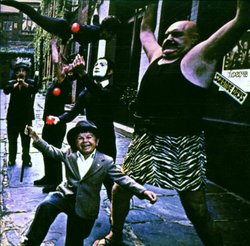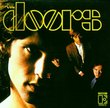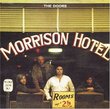| All Artists: Doors Title: Strange Days (Mlps) Members Wishing: 3 Total Copies: 0 Label: Wea International Original Release Date: 1/1/1967 Re-Release Date: 12/19/2006 Album Type: Import, Original recording remastered Genres: Alternative Rock, Pop, Rock, Classic Rock, Metal Styles: Hardcore & Punk, Psychedelic Rock, Album-Oriented Rock (AOR), Supergroups Number of Discs: 1 SwapaCD Credits: 1 UPC: 766486282520 |
Search - Doors :: Strange Days (Mlps)
 | Doors Strange Days (Mlps) Genres: Alternative Rock, Pop, Rock, Classic Rock, Metal
Remastered reissue of the classic album originally released in 1967. Packaged in a miniature LP sleeve reproduction of the original artwork. |
Larger Image |
CD DetailsSynopsis
Album Description Remastered reissue of the classic album originally released in 1967. Packaged in a miniature LP sleeve reproduction of the original artwork. Similar CDs
|
CD ReviewsA few gems amongst the leftovers on the second Doors album Lawrance M. Bernabo | The Zenith City, Duluth, Minnesota | 10/30/2004 (4 out of 5 stars) ""Strange Days" is just what you would expect to find in terms of a second album from a new group that has just put out a smash debut album. The self-titled first album of the Doors culled the group's best songs from their repertoire. Most of the songs here were written around the same time and if you had to reshuffle the tracks from the first pair of albums to make the debut effort even better you are talking about the title track, "Love Me Two Times" and "People Are Strange." The music is still the distinctive combination of psychedelic instrumentation and unconventional arrangements with the poetic visions of Jim Morrison, but the results are just not quite as great as that first outing. The opening track is interesting because in addition to Ray Manzarek's organ, Robbie Krieger's guitar, and John Densmore's drum, they have actually added a session musician, Doug Lubhan, to play bass. Meanwhile, Morrison sings about how "Strange days have found us/Strange days have tracked us down/They're going to destroy/Our casual joys/We shall go on playing/Or find a new town." There is a point there and the youth culture and the Sixties, but I find it hard to believe most of the people listening to this album in 1967 were thinking deep thoughts. "Love Me Two Times" is the big blues-rocker on the album, distinguished by Kreiger's captivating guitar riff and the great harpsichord solo from Manzarek. I know Morrison was the photogenic front man for the Doors, Manzarek and Kreiger were just as responsible for the group's unique sound. "Love Me Two Times" was a minor hit single off of the album, but its ascendancy was derailed when Morrison was arrested at a gig in New Haven, Connecticut. The first single released from the album was "People Are Strange," a rather simple song with Morrison singing about how "People are strange when you're a stranger/Faces look ugly when you're alone," starting off against Krieger's guitar playing before adding a bit of honkey tonk piano. Again there is a notion of Morrison singing about being outcasts and embracing the notion. The difference is this time the music stays out of the way so the lyrics stand out more. Of the rest of the tracks on "Strange Days" the best are the weird "You're Lost Little Girl" and the funky "Moonlight Drive," which may well be the oldest Doors song around and which again features Manzarak's keyboard playing. "My Eyes Have Seen You" and "I Can't See Your Face In My Mind" are nothing special and then the album ends with the 11-minute "When the Music's Over." This was a big number when the group played live (the alternative last song to "The End"), but it loses something in the studio. There is a solid beginning and end, but in the middle everybody gets to improvise while Morrison screams about ecological issues. However, the jamming tends to detract from the song as a political statement. All things considered, "Strange Days" would probably be considered a better album if we did not compare it to "The Doors."" Highly emotive, richly mysterious, melodically astounding Phil Rogers | Ann Arbor, Michigan | 10/30/2002 (5 out of 5 stars) "The Doors broke new ground once again, this time releasing a collection of songs some may feel is uneven; but this one pays great dividends the more you listen to it; myself I only half-listened for years, but just recently, finally put forth the effort. Though initially not all the tunes seemed melodically accessible - after I invested a bit more time and sensibility, the dividends started to accrue in a dramatically meaningful fashion. The way the engineer manages to allow all the instruments and the vocals to be heard and still maintain the Doors' signature murky sound is amazing. But it would be nothing if the musicians didn't allow every part/moment to dovetail together. Robby Krieger brilliantly re-invents the guitar (tonally, melodically, and harmonically) on every song, as well as on every instrumental break of "When the Music's Over", the long song/poem which closes out album. Ray Manzarek counters with mostly organ, but at times barroom piano or harpsichord. From him, also, you don't hear the same kinds of riffs or the same sound palette from song to song. And at times, each will be heard overdubbing a part with a different tonal setting, melody and rhythm, panned to the opposite side of the stereo field. So you'll have two organs, or else two guitars riffing off of each other, while Morrison's vocal pleads/saddens/exults/growls/hovers/screams somewhere in between.On the cover is a blue-tinted photograph of all these animated circus performers (somewhat reminiscent of Picasso's more quiescent painting of the "Family of Saltimbaques" from his Rose Period - the record is indeed the quintessential dark metaphysical/emotional/visceral circus. 'Sergeant Pepper' and 'The United States of America' may have started the carnival ball rolling . . . 'Strange Days' and [Procol Harum's] 'Shine On Brightly' rolled the big sonic circus ball underground, undersea, into heaven and hell and all points between. [The song ] "Strange Days" is the perfect beginning for what's to come [like a giant violet-and-gold-hued moth emerging from its chrysalis in the dead of night]. Ray Manzarek switches drawbars on his Hammond B-3 organ every four beats of the repeating ostinado introduction, creating a luscious viscerally appealing four-bar lead in. The three instrumentalists working in tandem generate an unbelievably inventive melodic/harmonic sound space. Morrison, when he reprises a verse does it differently each time, with intensely emoted melodic inversions, submersions, etc. His voice is fed through an electronic delay box (emerging ~½ beat late) and through some sort of weird combo algorithm of distortion/reverb/tremelo, then panned slightly left of his real vocal sound, the whole which further augments the already disjointed, mysterious atmosphere. The bassist has the main melody during instrumental breaks - the organ plays chord changes over his expressive (almost meandering) ostinado pattern. Even the drums are melodically impressionistic, in addition to providing the usual function of sonic timekeeping.Every song has something very different to say, both musically and lyrically. And the message, the poetry is, to my mind, moving and profound. Listen to the meaning of the words with your heart - your mind and possibly your life will never be the same. When Jim is singing about something that enrages him, the emotion is obvious; and when he sings about something that is sad or saddening to him, you hear the empathy in his voice. This is no detached, lightweight ego-tripper. The Doors are totally involved, totally committed to their muse(s), and it implodes/explodes/seeps into you with every beat and every phrase. "We want the world . . . and we want it . . . NOW!!!!!"..."
|

 Track Listings (10) - Disc #1
Track Listings (10) - Disc #1
